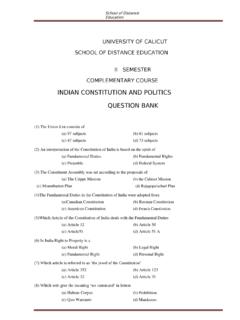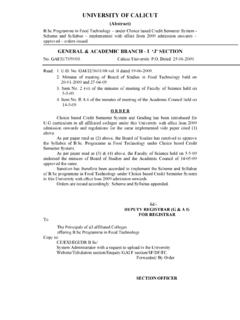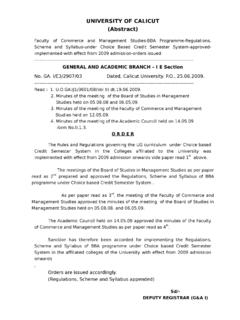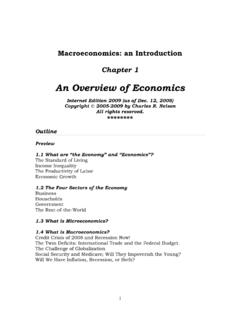Transcription of CO-OPERATIVE THEORY, PRINCIPLES& PRACTICE
1 CO-OPERATIVE THEORY, PRINCIPLES& PRACTICECORE COURSEVSEMESTERB Com(Specialization Co-operation)(2011 Admission)UNIVERSITY OF CALICUTSCHOOL OF DISTANCE EDUCATIONC alicut university , Malappuram Kerala, India 673 of Distance EducationCo-operative Theory, Principles& Practice2 UNIVERSITY OF CALICUTSCHOOL OF DISTANCE EDUCATIONSTUDY MATERIALCore CourseV SemesterBCom(Specialization-Co-operation ) CO-OPERATIVE THEORY, PRINCIPLES& Shemeera Kunhu,Assistant Professor,PG. Dept. of Commerce,Government College, MalappuramScrutinized by:Dr. K. Venugopalan,Associate Professor,Department of Commerce,Govt. College, :Computer Section, SDE ReservedSchool of Distance EducationCo-operative Theory, Principles& Practice3 CONTENTSPAGEMODULEIMEANING AND DEFINITION CO-OPERATION5 MODULEIICO-OPERATION AS A FORM OF BUSINESSORGANIZATION22 MODULEIIICO-OPERATIVE MOVEMENT IN INDIA ANDABROAD30 MODULEIVSUCCESSFUL CO-OPERATIVE MODELSABROAD40 School of Distance EducationCo-operative Theory, Principles& Practice4 School of Distance EducationCo-operative Theory, Principles& Practice5 MODULE IMEANING AND DEFINITION CO-OPERATIONCo-operation is derived from the Latin word Co-operari , Co means with and operari means to work.
2 Hence co-operation meansWorking Togetherwith others for acommon , a Philosopher of Ancient Greece, recognized the social nature of man whenhe said, Man is a Social Animal .Man cannot lead a happy and contented life if he lives inisolation. Therefore, there isa great need for Co-operation, which can be considered as thebasic principle underlying human Primitive concept of Co-operation was related more to cultural, religious andsocial aspects. Co-operation was a way of life and it was inherent in the Society itself. TheModern concept of Co-operation is altogether different from the primitive one. It denotes a special method of doing business HajeelaThe word Co-operation literally means Working Together or Act Together. Accordingto the Sociologists CO-OPERATIVE Movement is an instrument for establishing social harmonythrough the removal of class are of the opinion that CO-OPERATIVE is a means of countering theexploitation of weaker sections by conferring on them a better economic a legal sense, Co-operation signifies special privileges and concessions conferred bylaw on its to the Socialist CO-OPERATIVE School, Co-operation is a weapon for thedevelopment of socialist thought and the realization of firms or households for businesspurpose and economic institution through which economic activity is conducted in thepursuit of economic objectives.
3 McLegan Committee Defines Co-operation as The Theory of co-operation is verybriefly, theisolated and powerless man can, by association with others and by moraldevelopment and mutual support obtain, in his own degree, the material advantage availableto wealthy or powerful persons and whereby develop himself to the fullest extent of hisnatural abilities. By the union of forces, material advancement is secured and by united actionself-reliance is fostered and it is from the inter-action of the influences that it is hoped toattain the effective realization of the higher and more prosperous standard of life which hasbeen characterized as better business , better farming and better living .School of Distance EducationCo-operative Theory, Principles& Practice6 CO-OPERATIVE Societies can help the transformation from Capitalism to Socialismand finally to Communism.
4 LeninThe basic idea behind Co-operation is Self Help and Mutual Help and Mutual Aid and Each for all and all for each .FEATURES OF CO-OPERATIVESCo-operation is a special method of doing business. It has the following features:1. An Association of PersonsA CO-OPERATIVE Society comes into existence when a group of individuals join hand andform an Enterprise or UndertakingCo-operation lays stress on ethical standard and it is basically an enterprise. It is run bymembers themselves at their own cost and individual is free to join the Society and resign from his membership of the Societyat his will and ObjectiveThe main object of CO-OPERATIVE society is to serve its members rather than to ManagementThe CO-OPERATIVE Society follows the cardinal principle of democracy , one man onevote. The affairs are handled by the Board of Directors. The capital does not get anyspecial treatment over human being in discrimination among members is made on the grounds of religious faith, politicalideology, and educational qualifications and so of Social JusticeThere is no class division among capitalists and working class in part of Socio-economic MovementThe CO-OPERATIVE movement is viewed as a constituent part of the overall socio-economic movement of the is based on proportionality or equalityThe surplus is distributed not according to share taken but according to the proportionof business operation a member has effected with the is a Universal Movement found in all countries of the of Distance EducationCo-operative Theory, Principles& Practice7 VALUES OF CO-OPERATIONC ooperatives are typically based on the cooperative values of "self-help, self-responsibility.
5 Democracy and equality,equity and solidarity" and the and open member participation by and , training and among for communityCooperatives are dedicated to the values of openness, social responsibility and caring forothers. Such legal entities have a range of social is open, meaningthat anyone who satisfies certain non-discriminatory conditions may join. Economic benefitsare distributed proportionally to each member's level of participation in the cooperative, forinstance, by a dividend on sales or purchases, rather than according may be classified as eitherworker,consumer,producer,purchasin gorhousingcooperatives. They are distinguished from other forms of incorporation in that profit-makingor economic stability are balanced by the interests of the Nationshad declared 2012 to bethe International Year of Cooperatives (IYC).OBJECTIVES OF CO-OPERATIONSelf-help made effective by organization is called CO-OPERATIVE Society.
6 The main objectives ofco-operatives of co-operatives are: Elimination of MiddlemenThe First and foremost objective of CO-OPERATIVE society is to remove the middlemen indifferent fields, who take away the gains that should have gone to the realbeneficiaries. Raising economic status of the poorThe most basic aim of a CO-OPERATIVE society is to raise the standard of living of of Distance EducationCo-operative Theory, Principles& Practice8 Removal of the ills of capitalismThe basic cause of the ills of capitalism is the profit motive. This leads to exploitation,class struggle, economic inequality and unfair competition. These evils adverselyaffected the interestof workers and gave birth to CO-OPERATIVE movement. Thereforethe aim of co-operation is to restrict the amount of profit and provide better service toits members. Raising moral standards of its membersCo-operative movement wishes to direct human life towards goodness by raising theirmoral standard.
7 Increasing the prosperity of the whole CO-OPERATIVE society aims at bringing about the welfare of not a particular individualbut of the whole community. Abolition of Social InequalitiesThe feeling of high or low among members of the community act as a cause of socialtensions, the removal of which is the goal of the CO-OPERATIVE movement. Political and Religious NeutralityAs far as possible, a CO-OPERATIVE remains aloof from political parties and religiousgroups. Development of Corporate LifeA CO-OPERATIVE aims at providing a corporate life to the weaker sections of OF CO-OPERATIONThe benefits of co-operation are studied under three broad categories viz., and Political BenefitsThe following are the Economic Benefits derived out of CO-OPERATIVE Form. The substitution of profit incentive in business by that of service to the community. A more equitabledistribution of wealth.
8 A break up of monopolistic of Distance EducationCo-operative Theory, Principles& Practice9 Increase in purchasing power and real wages to individuals. Reduction in cost of distribution system by elimination of unnecessary middlemen. The more accurate correlation of demand and supply. Stabilization of employment. General improvement in employer, employee relationships. Cheap marketing and processing of farm products at reasonable and Political BenefitsThe important Social Benefits are as follows: To provide a unique education in democracy, responsibility and toleration. To train for political power. To evolve an industrial relationship among all. To preserve a strong friendly or family spirit and sense of pride and power whichis impersonal. To secure rational construction and unifying approaches to social and economicproblems. To prevent underemployment and unemployment To secure moral as well as physical satisfaction of pure quality, correct weight andfair dealings.
9 To prevent exploitation of man by The individuals lean by experience gained in practical work of co-operation. Co-operation also sponsors education . There are many CO-OPERATIVE schools andcolleges formed to provide affordable education and also employment to educatedunemployed Benefits The policy of honesty is a necessity in co-operation Cooperation returns money value for honesty and other virtues. The motto of co-operation is each for all and all for each Co-operation aims at the production of fine human of Distance EducationCo-operative Theory, Principles& Practice10 HISTORY OF THE CO-OPERATIVE MOVEMENTCO-OPERATIVE MOVEMENT ABROADT hehistory of the cooperative movementconcerns the origins and history cooperative arrangements, such asmutual insurance, and principles of cooperationexisted long before, the cooperative movement began with the application of cooperativeprinciples to business movement in EuropeThe cooperative movement began in Europe in the 19th century, primarily in Britainand France.
10 The ShorePorters Society claims to be one of the world's first cooperatives,being established inAberdeen(UK) in 1498 (although it has sincedemutualizedto become aprivatepartnership).Theindustrial revolutionand the increasing mechanization of theeconomy transformed society and threatened the livelihoods of many workers. Theconcurrentlabourandsocial movementsand the issues they attempted to address describethe climate at the Fenwick Weaver sSociety was founded in 1761, inFenwick (UK)and isconsidered one of the first co-operatives in the world. In the decades that followed, severalcooperatives or cooperative societies formed and by 1830, there were several hundred co-operatives. Some were initially successful, but most cooperatives founded in the early 19thcentury had failed by 1840. However, Lockhurst Lane Industrial CO-OPERATIVE Society(founded in 1832 and nowHeart of England CO-OPERATIVE Society), and Galashiels and HawickCo-operative Societies (1839 or earlier, merged with The CO-OPERATIVE Group) still was not until 1844 when theRochdale Society of Equitable Pioneersestablished the Rochdale Principles on which they ran their cooperative, that the basis for development andgrowth of the modern cooperative movement was ,credit unionswere invented in Germany in the mid-19th century, first byFranz Hermann Schulze-Delitzsch(1852, urban), then byFriedrich Wilhelm Raiffeisen(1864,rural).


















